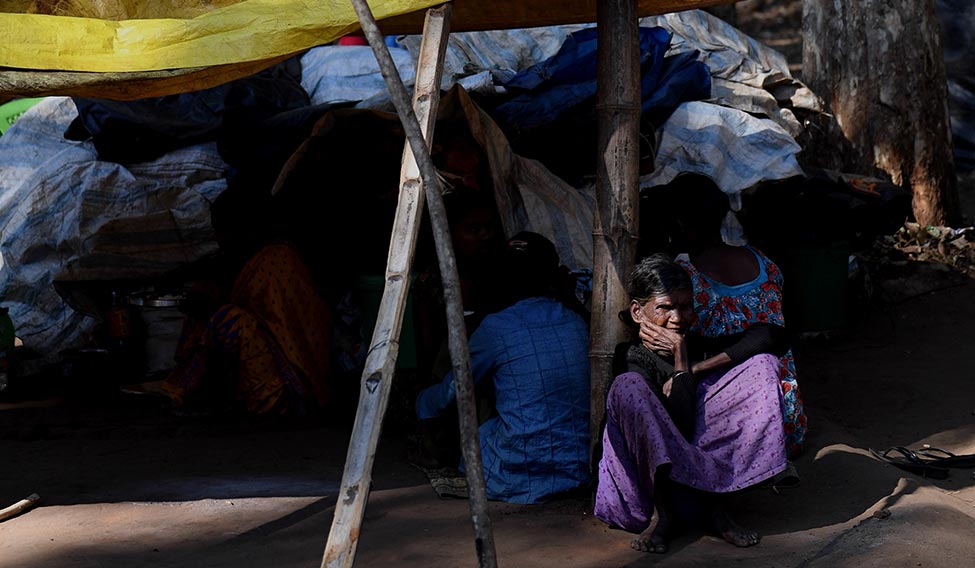On a cold December morning, when Diddalli village in Kodagu’s Devamachi reserve forest zone was still enveloped in darkness, earthmovers rumbled in and razed 577 bamboo huts. The inhabitants belonging to Jenu Kuruba, Erava, Paniya and Kadu Kuruba tribes were horrified as they had not received any notice.
Out of sheer desperation, Muthamma, a mother of four, stripped herself naked in protest. Soon, others followed, hoping it would stall the eviction process. But, within an hour, the police drove nearly 1,500 tribals into the woods. Though they soon returned, raising slogans like “land is our right, not alms” and asking the government to rebuild their huts, the authorities issued prohibitory orders in the region and installed CCTV cameras, which further angered the tribals.
“Are we animals to be monitored through CCTVs? Why deploy special forces? Are we terrorists? The government has opened a ganji kendra (community meal centre) to feed us. But they ask so many questions before serving us a meal. Why are we being humiliated? We will be forced to end our lives,” said J.K. Samy, a tribal worker.
The district administration and wildlife activists said the tribals were living inside a reserve forest area. “The Forest Rights Act grants rights to people who have been in possession of forest land prior to December 13, 2005. In Diddalli, the families moved in only last June and their claims cannot be honoured,” said Praveen Bhargav, managing trustee of Wildlife First, a conservation advocacy organisation. Muthamma said their huts were on the forest buffer land and not inside the reserve. “The officials are manipulating the forest map to help certain vested interests,” she said.
The forest department said the eviction was necessary to save the shrinking forest cover in the district. Environmental activists supported it saying the government could not change the boundaries of reserve forests.
Tribals moved into Diddalli last year, abandoning their plantation workers’ quarters elsewhere and building new hutments. Muthamma said 577 tribal families from Thithimati, Srimangala, Kutta and Ammathi had made Diddalli their home.
Rani, 40, and her husband, Raju, 55, said the wages were better in Diddalli. “We earned Rs 200 daily. Our ancestors lived here and we decided to come back here,” said Rani. “We want our children to get educated. Here, there is a school, hospital and good roads,” said Raju.
As the eviction became a political issue, Chief Minister Siddaramaiah directed Social Welfare Minister H. Anjaneya to talk with the tribals and resolve the matter. “The tribals need to be brought to the mainstream. So we have identified land to build their homes under the Rajiv Gandhi Housing Scheme. They will be given free cooking gas connections, too, to reduce their dependency on the forest for fuel,” said Siddaramaiah. M.R. Seetharam, minister in charge of Kodagu district, said 12 acres in Basavanahalli near Kushalnagar was identified to resettle the tribals.
The authorities have set up tarpaulin sheds for the evicted tribals, installed mobile toilets, opened a community meal centre and are running a health camp. The tribals, however, want the government to rebuild their dwellings. “We want our houses to be rebuilt at the same spot. The government is discriminating between the rich and the poor as there are many planters encroaching upon forest lands,” said Kavya, an 18-year-old girl, who moved into Diddalli with her parents last September.
Kodagu MP Pratap Simha asked the government to prioritise the resettlement. “There is no legal provision to allot sites inside the reserve forest, but sites can be allotted in Somwarpet or Dubare, which have 256 acres and 53 acres of government land, respectively, already identified for the purpose,” said Simha.
One of the triggers for the showdown is the influx of migrant workers from Assam. Many coffee planters have employed migrants, who work for cheaper wages and longer hours than the local tribals. This has soured the longstanding planter-worker relations. It is said that there are 30,000 Assamese workers in Kodagu. The exodus of the tribals from the coffee plantations to form ghettos is seen as an effort to bargain hard for better wages.
“We are tired of the plantation work as we are forced to live in labour lines like bonded labourers,” said Samy. “Our life depends on the whims of the estate owner. We are shunted out frequently and our wages remain Rs 80 to Rs 120 a day,” he said. Chinnappa, another tribal worker, said the government was under pressure to evict them. “It is the coffee harvest season and the planters want us to get back to work,” he said. The planters suspect a Maoist hand in the escalation of the protests. Former Naxal leaders like Sirimane Nagaraj have joined the tribal protest.
The tribal unrest points to a total failure of the Integrated Tribal Development Project (ITDP) in Karnataka. According to a report by the Comptroller and Auditor General, Karnataka failed to utilise Rs 22,571 crore of Rs 1,53,936 crore sanctioned for the project. The CAG found that the benefits of the schemes were not reaching genuine beneficiaries.
Bhargav said only an audit of the ITDP by an independent agency and effective resettlement plans could provide succour to the tribals. “Human interference like tribal housing, resorts, plantations and development protects like roads and dams have shrunk the forests to 10 per cent against the national goal of 30 per cent,” he said. “We cannot save wildlife or reduce man-animal conflict without restoring wildlife habitats.”







